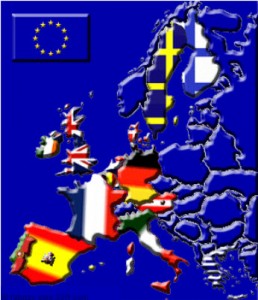 Last week news organizations and financial markets were reacting like chickens with their heads cut off to efforts by the European Union to deal with its current debt crisis and put in place measures to prevent another one.
Last week news organizations and financial markets were reacting like chickens with their heads cut off to efforts by the European Union to deal with its current debt crisis and put in place measures to prevent another one.
At the end of this EU summit on Friday news reports and financial analyses indicated that the member countries had reached an agreement to fully integrate their fiscal and monetary policies.
The agreement requires them, among other things, to submit their national budgets to a central committee in Brussels for approval: This extraordinary surrender of national sovereignty is intended to ensure that each country maintains the prescribed debt-to-GDP ratio to avoid any of them racking up the kind of national debt that has Greece teetering on the precipice of bankruptcy. It is also intended to reinforce the economic and political fundamentals that buttress the value of the euro, which is looking lately like it’s headed for the dustbin of history.
Yet upon careful reading it becomes clear that this agreement is not worth the paper it’s written on. Not least because it is merely an agreement to enshrine these new rules in a side agreement at some undetermined date (next spring). There’s also the inconvenient fact that similar debt and deficit rules are already in place and, more to the point, that the only reason the EU finds itself in this mess is that only a few EU countries have bothered to abide by these rules.
But all one has to do is reflect for a second on how multilateral agreements to combat climate change have been summarily flouted by all parties to appreciate what little chance this one has of being honored by member countries and enforced by Brussels.
 In fact, the EU’s two most prominent leaders, Chancellor Angela Merkel of Germany and President Nicolas Sarkozy of France, betrayed their concerns in this respect by attempting to codify these new rules as part of an amended, if not entirely new, European treaty to give them more weight.
In fact, the EU’s two most prominent leaders, Chancellor Angela Merkel of Germany and President Nicolas Sarkozy of France, betrayed their concerns in this respect by attempting to codify these new rules as part of an amended, if not entirely new, European treaty to give them more weight.
Except that their attempt was foiled in dramatic fashion when British Prime Minister David Cameron shocked the world by exercising the UK’s veto to block it. Cameron insists that he acted to protect Britain from fees on financial transactions that would cripple its thriving finance industry.
But opposition Labour leader Ed Miliband led the chorus of UK critics who accused him of doing nothing more than pandering to the Eurosceptic backbenchers in his Conservative Party – who, incidentally, consider making political compromises with Europeans every bit as treasonous as Tea Partiers in the Republican Party consider making them with Democrats.
In fairness to Cameron, however, these critics seem oblivious to the fact that no less a person than his predecessor, Labour Prime Minister Gordon Brown, established this untenable precedent of trying to carve out special exceptions for Britain as a condition of remaining within the EU. For here is how I commented on Brown’s attempt to do just that four years ago at an EU summit on drafting a new constitution:
[N]othing justifies my skepticism (over the viability of an EU constitution) quite like the Sisyphean attempts by British Prime Minister Gordon Brown to reconcile the contradictions inherent in this treaty. Because, according to the BBC, he boasted in recent parliamentary debates – without any hint of irony – that he had secured ‘special treatment for the UK in a range of areas’ at the European summit and that Britain would keep opt-outs on foreign policy, labor rights, tax and social security.
But if Britain has already established the untenable precedent that it can ‘opt-out’ of all of the key provisions of the treaty, then what is the legal and substantive effect of this ersatz constitution?!
(A dead EU constitution resurrected as a ‘new treaty’…, The iPINIONS Journal, November 27, 2007)
 It may be that no man is an island unto himself, but Britain seems determined to remind Europeans that, as countries go, it is an island unto itself … literally. And say whatever one might about Britain’s imperiousness and intransigence in this respect, there’s no gainsaying its good sense to stay out of the euro years ago, and Cameron’s decision to beg off this new fiscal agreement today may prove equally sensible.
It may be that no man is an island unto himself, but Britain seems determined to remind Europeans that, as countries go, it is an island unto itself … literally. And say whatever one might about Britain’s imperiousness and intransigence in this respect, there’s no gainsaying its good sense to stay out of the euro years ago, and Cameron’s decision to beg off this new fiscal agreement today may prove equally sensible.
For their part, Europeans responded to this latest attempt to enshrine British exceptionalism into the EU’s foundational documents by saying, in essence, good riddance Britain! Because here, according to the December 9, 2011 edition of Der Speigel Online, is just a sample of the indignation Cameron’s veto incited:
The country is primarily damaging itself. [The British must now decide if they want to be in the EU club or not.]The game of always wanting to have a say in the debate while also wrecking every compromise is not acceptable in the long run. You can’t be a little bit pregnant. It must be made clear to Great Britain: Either you want the whole package, or you can leave it alone.
(Manfred Weber, vice chairman of the European People’s Party)
Cameron is a coward.
(Franco-German politician Daniel Cohn-Bendit, co-chairman of the Greens)
It was a mistake to admit the British into the European Union… [The UK must now renegotiate its relationship with the EU.] Either they do it by themselves, or the EU will be founded anew – without Great Britain.
(Alexander Graf Lambsdorff, German MEP and vice-chairman of ALDE [Alliance of Liberals and Democrats for Europe])
This final reaction is especially instructive. Because it gets at the heart of what makes the EU by definition a legal fiction. There is a growing feeling among a critical mass of Germans, for example, that the EU should be founded anew without countries like Portugal, Italy, Greece and Spain, the so-called PIGS, because the only thing they add to the union is an unsustainable financial burden.
Never mind that it was a quixotic venture to try to create a “United States of Europe” in the first place given the fractious history and prevailing cultural differences among member countries – ranging from the industrious and financially prudent Germans in the north to the lazy and financially profligate Greeks in the south. After all, the only truly organizing principle the 27 member countries share is enjoying the benefits of a free trade eurozone, which does not require using a single, inflated currency (think NAFTA).
So only God knows what will become of the seemingly determined efforts by the other 26 member countries to enter into a new fiscal and monetary union. I am not even convinced that all of them will sign the agreement when the time comes next spring, let alone abide by the new rules.
What is certain though is that the treaty that established the EU 20 years ago this month is now, for all intents and purposes, dead.
Related commentaries:
A dead EU constitution…
Greece: from cradle of civilization to beggar’s colony